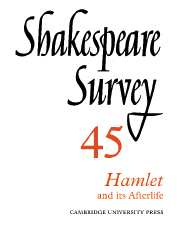Book contents
- Frontmatter
- The Reception of Hamlet
- ‘Hamlet, Revenge!’: The Uses and Abuses of Historical Criticism
- Revision by Excision: Rewriting Gertrude
- Gazing at Hamlet, or the Danish Cabaret
- ‘He’s Going to his Mother’s Closet’: Hamlet and Gertrude on Screen
- Shakespeare Rewound
- Freud’s Hamlet
- ‘Pray you, undo this button’: Implications of ‘Un-’ in King Lear
- Marx and Shakespeare
- Peter Street, 1553–1609: Builder of Playhouses
- Shakespeare Performances in England 1990–1
- Professional Shakespeare Productions in the British Isles, January–December 1990
- 1 Critical Studies
- 2 Shakespeare’s Life, Times, and Stage
- 3 Editions and Textual Studies
- Books Received
- Index
‘Hamlet, Revenge!’: The Uses and Abuses of Historical Criticism
Published online by Cambridge University Press: 28 March 2007
- Frontmatter
- The Reception of Hamlet
- ‘Hamlet, Revenge!’: The Uses and Abuses of Historical Criticism
- Revision by Excision: Rewriting Gertrude
- Gazing at Hamlet, or the Danish Cabaret
- ‘He’s Going to his Mother’s Closet’: Hamlet and Gertrude on Screen
- Shakespeare Rewound
- Freud’s Hamlet
- ‘Pray you, undo this button’: Implications of ‘Un-’ in King Lear
- Marx and Shakespeare
- Peter Street, 1553–1609: Builder of Playhouses
- Shakespeare Performances in England 1990–1
- Professional Shakespeare Productions in the British Isles, January–December 1990
- 1 Critical Studies
- 2 Shakespeare’s Life, Times, and Stage
- 3 Editions and Textual Studies
- Books Received
- Index
Summary
For more than two centuries critics of Hamlet were in agreement that Hamlet is morally obligated to take revenge on Claudius. It is only in our time that many historical critics have asserted that Elizabethans would not have readily accepted the ghost's injunction as a command that Hamlet must in all conscience obey and that we, if we are to be true to Shakespeare, must respond in the same manner. It is rare that there has been so sharp a reversal of general critical opinion.
It is fascinating to survey the major historical criticism on the subject of Hamlet's revenge and on such ancillary matters as the reasons for Hamlet's delay, the nature of the ghost, and the significance of the play's conclusion. The fray on the critical battlefield has its peculiar interest, as we observe interpretations advanced and disputed, errors made and refuted. For historical criticism is, of course, no magic talisman. Critics using the historical method can go wildly wrong, just as critics who rely only on their acumen can have insights that are corroborated by historical scholarship. But, in spite of the confusion of the fray, something approaching a substantial body of opinion has emerged from it - there can never be total assent - that has superseded the previous predominant body of opinion.
So convinced were the critics of the nineteenth century that Hamlet has a duty to kill Claudius that the favourite critical question was 'Why does Hamlet delay?' Like the ghost of the earlier Hamlet that was Shakespeare's source, which, said Thomas Lodge, cried like an oyster-wife, 'Hamlet, revenge!', they called repeatedly for him to take action. Men who spent their lives in their studies, where the greatest violence they committed was the slitting open of envelopes with paper knives, charged him with being an irresolute intellectual or with being of too delicate a sensibility to do the thing he had to do.
- Type
- Chapter
- Information
- Shakespeare Survey , pp. 15 - 26Publisher: Cambridge University PressPrint publication year: 1992



